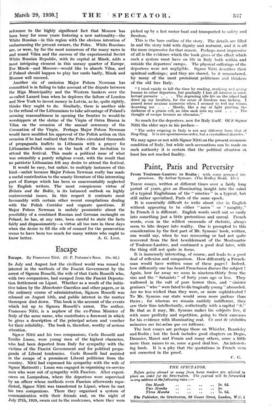Escape
Escape. By Francesco Nitti. (G. P. Putnam's Sons. 10s. 6d.) IN July and August last the civilized world was roused to interest in the methods of the Fascist Government by the arrest of Signora Rosselli, the wife of that Carlo Rosselli who, with two companions, had escaped from the Fascist Deporta- tion Settlement on Lipari. Whether as a result of the initia- tive taken by the Manchester Guardian and other papers, or in the ordinary course of administration, Signora Rosselli was released on August 15th, and public interest in the matter thereupon died down. This book is the account of the events which led up to Signora Rosselli's arrest. The author, Francesco Nitti, is a nephew of the ex-Prime Minister of Italy of the same name, who contributes a foreword in which he gives a description of the principal actors and voucher for their reliability. The book is, therefore, worthy of serious attention.
Signor Nitti and his two companions, Carlo Rosselli and Emilio Lussu, were young men of the highest character, who had been deported from Italy for sympathy with the victims of the Fascist Government and for political propa- ganda of Liberal tendencies. Carlo Rosselli had assisted in the escape of a prominent Liberal politician from the country. Nitti had expressed his sympathy with the wife of Signor Matteotti ; Lussu was engaged in organizing ex-service men who were out of sympathy with Fascism. After experi- ences on Lampedusa, where the deportees were supervised by an officer whose methods even Fascism afterwards repu- diated, Signor Nitti was transferred to Lipari, where he met his two companions. There they organized a system of communication with their friends and, on the night of July 27th, 1929, swam out to the rendezvous, where they were
picked up by a fast motor boat and transported to safety and freedom.
This is the bare outline of the story. The details are filled in and the story told with dignity and restraint, arid it is all the more impressive for that reason. Perhaps most impressive of all is the evidence which the book gives of the effect which such a system must have on life in Italy both within and outside the deportees' camps. The physical sufferings of the deportees were not negligible. Signor Nitti describes their spiritual sufferings ; and they are shared, be it remembered, by many of the most prominent politicians and thinkers of the old free Italy.
" I tried vainly to kill the time by reading, studying and giving lessons to other deportees, but gradually I lost all interest in intel- lectual pursuits . . . The degrading idle life on the island had dried up my faculties, for the sense of freedom was lacking. I passed some anxious moments when I seemed to feel my reason deserting me . . . Slowly, like a ray of light piercing the darkness of a prison cell, an idea sank into my soul . . . The thought of escape became an obsession."
So much for the deportees, now for Italy itself. Of it Signor Nitti the elder says in his preface-
" The order reigning in Italy is not any different from that of Sing-Sing. It is not spontaneous order, but a crystallized disorder."
We may agree or not with Signor Nitti on the present economic condition of Italy, but while such accusations can be made on such authority it is certain that the political situation at least has not reached finality.














































 Previous page
Previous page